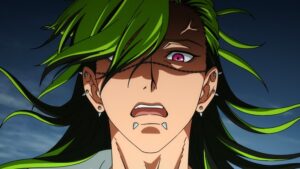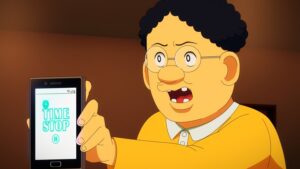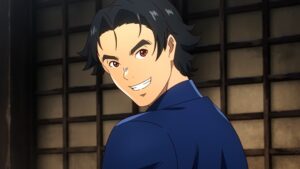BUCCHIGIRI?!
Short Synopsis (Anilist): Arajin Tomoshibi’s reunion with his old pal Matakara Asamine takes an unexpected turn when they stumble into a brawl with the toughest guys in town. And just when you thought things couldn’t get weirder, a colossal genie decides to drop in. Brace yourself for the ultimate showdown. It’s the clash of the cool and the magical!
By all rights, Bucchigiri should not be good. It’s over the top, garishly colored, and absolutely ridiculous. Every character is a caricature. It’s everything we’ve seen multiple times before in series like that delinquent harem show from a few seasons back. And yet… It’s so expressively animated that the over the top nature just works, it fits. Every scene, every reaction, every dialogue, is punctuated with these bold and exaggerated animations that I can’t help but love it. And color wise? Everything from the skin to the hair is saturated such that even bright green hair or yellow shirts don’t feel that out of place with the rest of their outfits or skin tones. I’m honestly shocked at how strong this episode is. Maybe this is just me overreacting to one of the few good premiers in a season of mediocrity, but I can’t help but love what Bucchigiri is doing. Even the MCs main desire, to lose his virginity, is played so straight as a justifiable reason to stand up and push back against abuse, that I can’t help but cheer him on. I sincerely hope Bucchigiri manages to keep this up, that the production doesn’t fall off a cliff, that the story doesn’t become just another weekly battle series with a braindead plot. Because right now? This is some of the most fun I’ve had this season.
Potential: 75%
Snack Basue
Short Synopsis (Anilist): The gag comedy manga centers on a bar in Sapporo’s North 24th neighborhood, five stations away from the Susukino business district. There, the bar’s proprietor, junior proprietor, odd regular customers, and its share of walk-ins recount their strange lives.
Something about Snack Basue just seems… off? Is this vector animated? All of the movement feels so… stilted. You kind of get used to it after a while, but it’s definitely not very appealing. And that sort of applies to the show as a whole. It’s trying to be this conversational, talk-show style of comedy, but it relies so much on the awkwardness of this first meeting, on the experience of going to a snack bar, and the absurdity of some of its cast, that I felt more weirded out than I did amused. Ultimately I leave this episode wondering what it was I just watched, and why it ever got animated to begin with.
Potential: 0%
Meiji Gekken: 1874
Short Synopsis (Anilist): By 1874, seven years have passed since the end of the samurai era. A former samurai, Shizuma Orikasa works as a rickshaw driver in Tokyo while looking for his fiancée, Sumie Kanomata, who went missing during the Boshin War. Shizuma thwarts an assassination attempt and joins the newly established police department, where he’ll fight to stop dark forces from overthrowing the government.
Look I love the Boshin war and the beginning of the Meiji era, it’s a fascinating time in history. Between westernization and industrialization, Japanese society changed so much so rapidly that large swaths of the country were left behind. And Meiji Gekken has some of that in its DNA, what with a former samurai MC trying to make a life in this new era. He’s fine! But where it falls short is in its conflict, its villains, the reaction to this new era. To show what I mean, think back to the recent remake of Ruroni Kenshin. There the villains meant something, even if they were only around for an episode. They represented ideals, past ways of life, specters of past deeds, men and women who couldn’t find a place in this new era and were shunned because of it. Here though… It’s this sort of bland “revolution”, like Meiji Gekken is banking on a classic “return to the old ways” sort of narrative. But it muddies the water by also introducing foreigners like the British to the mix, making it no longer an internal struggle for the identity of the nation? I’m reading a lot into it this early, but what I’m saying is that Meiji Gekken feels like its using this transitional period in Japanese history as an aesthetic for a classic battle-series setup, more than as a meaningful setting for its narrative. And that kind of turns me off, despite the MC otherwise being decent. Go watch the Kenshin remake instead.
Potential: 10%





